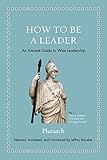How to Be a Leader : An Ancient Guide to Wise Leadership / Plutarch; ed. by Jeffrey Beneker.
Material type: TextSeries: Ancient Wisdom for Modern ReadersPublisher: Princeton, NJ : Princeton University Press, [2019]Copyright date: ©2019Description: 1 online resource (416 p.)Content type:
TextSeries: Ancient Wisdom for Modern ReadersPublisher: Princeton, NJ : Princeton University Press, [2019]Copyright date: ©2019Description: 1 online resource (416 p.)Content type: - 9780691192116
- 9780691197807
- 873/.01 23/eng
- PA4368
- online - DeGruyter
- Issued also in print.
| Item type | Current library | Call number | URL | Status | Notes | Barcode | |
|---|---|---|---|---|---|---|---|
 eBook
eBook
|
Biblioteca "Angelicum" Pont. Univ. S.Tommaso d'Aquino Nuvola online | online - DeGruyter (Browse shelf(Opens below)) | Online access | Not for loan (Accesso limitato) | Accesso per gli utenti autorizzati / Access for authorized users | (dgr)9780691197807 |
Browsing Biblioteca "Angelicum" Pont. Univ. S.Tommaso d'Aquino shelves, Shelving location: Nuvola online Close shelf browser (Hides shelf browser)

|

|

|

|

|

|

|
||
| online - DeGruyter The German NOVELLE / | online - DeGruyter Our Great Purpose : Adam Smith on Living a Better Life / | online - DeGruyter Changing Places : The Science and Art of New Urban Planning / | online - DeGruyter How to Be a Leader : An Ancient Guide to Wise Leadership / | online - DeGruyter American JewBu : Jews, Buddhists, and Religious Change / | online - DeGruyter Religious Parenting : Transmitting Faith and Values in Contemporary America / | online - DeGruyter Shakespeare and the Folktale : An Anthology of Stories / |
Frontmatter -- CONTENTS -- INTRODUCTION -- NOTES ON THE TRANSLATION AND GREEK TEXT -- TO AN UNEDUCATED LEADER -- HOW TO BE A GOOD LEADER -- SHOULD AN OLD MAN ENGAGE IN POLITICS? -- IMPORTANT PERSONS AND TERMS -- NOTES
restricted access online access with authorization star
http://purl.org/coar/access_right/c_16ec
Timeless advice on how to be a successful leader in any fieldThe ancient biographer and essayist Plutarch thought deeply about the leadership qualities of the eminent Greeks and Romans he profiled in his famous-and massive-Lives, including politicians and generals such as Pericles, Alexander the Great, Julius Caesar, and Mark Antony. Luckily for us, Plutarch distilled what he learned about wise leadership in a handful of essays, which are filled with essential lessons for experienced and aspiring leaders in any field today. In How to Be a Leader, Jefferey Beneker presents the most important of these essays in lively new translations accompanied by an enlightening introduction, informative notes, and the original Greek on facing pages.In "To an Uneducated Leader," "How to Be a Good Leader," and "Should an Old Man Engage in Politics?" Plutarch explains the characteristics of successful leaders, from being guided by reason and exercising self-control to being free from envy and the love of power, illustrating his points with memorable examples drawn from legendary Greco-Roman lives. He also explains how to train for leadership, persuade and deal with colleagues, manage one's career, and much more.Writing at the height of the Roman Empire, Plutarch suggested that people should pursue positions of leadership only if they are motivated by "judgment and reason"-not "rashly inspired by the vain pursuit of glory, a sense of rivalry, or a lack of other meaningful activities." His wise counsel remains as relevant as ever.
Issued also in print.
Mode of access: Internet via World Wide Web.
In English.
Description based on online resource; title from PDF title page (publisher's Web site, viewed 21. Jun 2021)


